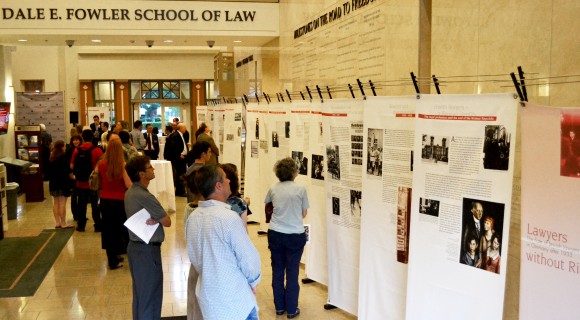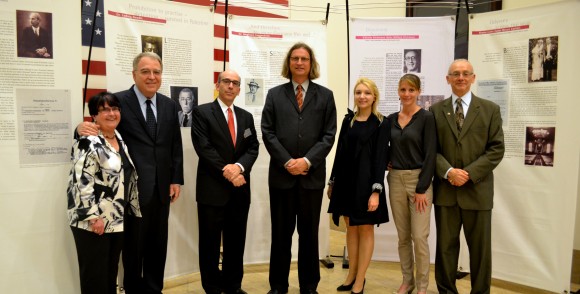“Lawyers Without Rights” Exhibit to Run Through November 21 at Fowler School of Law
November 12, 2014
Lawyers Without Rights: Jewish Lawyers in Germany under the Third Reich
is an important ongoing exhibit at Chapman University Dale E. Fowler School of Law. The exhibit will be on public display through November 21, 2014 and is open during normal business hours, Monday through Friday from 8 a.m. to 9 p.m. Created by the German Federal Bar, it depicts how Jewish lawyers and jurists were barred from German courts beginning in 1933, and how individual rights and the rule of law were obliterated during the Nazi era. To date, it has been shown in over 80 cities worldwide.

Lawyers Without Rights
opened at the Fowler School of Law on Monday, October 13, 2014. The opening night included a welcome speech from Fowler Law Professor Michael Bazyler, who was instrumental in bringing the exhibit to Chapman. The evening also included a keynote talk by Honorable Richard D. Fybel, Associate Justice of the Court of Appeal, who co-teaches the advanced seminar “Holocaust, Genocide and the Law” at the Fowler School of Law. For a background about
Lawyers Without Rights
, see ”
Legal Injustice: The Lawyers Without Rights Exhibit
” from the Chapman University Rodgers Center for Holocaust Education.

(from the left) Dr. Marilyn Harran, Chapman University; Justice Richard Fybel; Daniel Bogart, Fowler School of Law Associate Dean of Academic Affairs; Stefan Biedermann, German Deputy Counsel General; Yasmin Weber, Junior Attorney, German Consulate; Anna Weiss, German Consulate Legal Intern; and Professor Michael Bazyler
Holocaust education at Chapman University
has grown from a single course into a distinctive multi-faceted program. While many other universities teach about the Holocaust, Chapman is distinguished among both private and public universities by its fusion of curricular, co-curricular and community programs.
Professor Michael Bazyler recently published the book,
Forgotten Trials of the Holocaust
. He is presently working on two new books: a textbook based upon his Holocaust law course entitled
Holocaust, Genocide and the Law
(with S. Garkawe) and a comparative law casebook entitled
Comparative Law: Global Legal Traditions in the 21st Century
(with R. Miller, P. Yu and A. An-Na’im).
